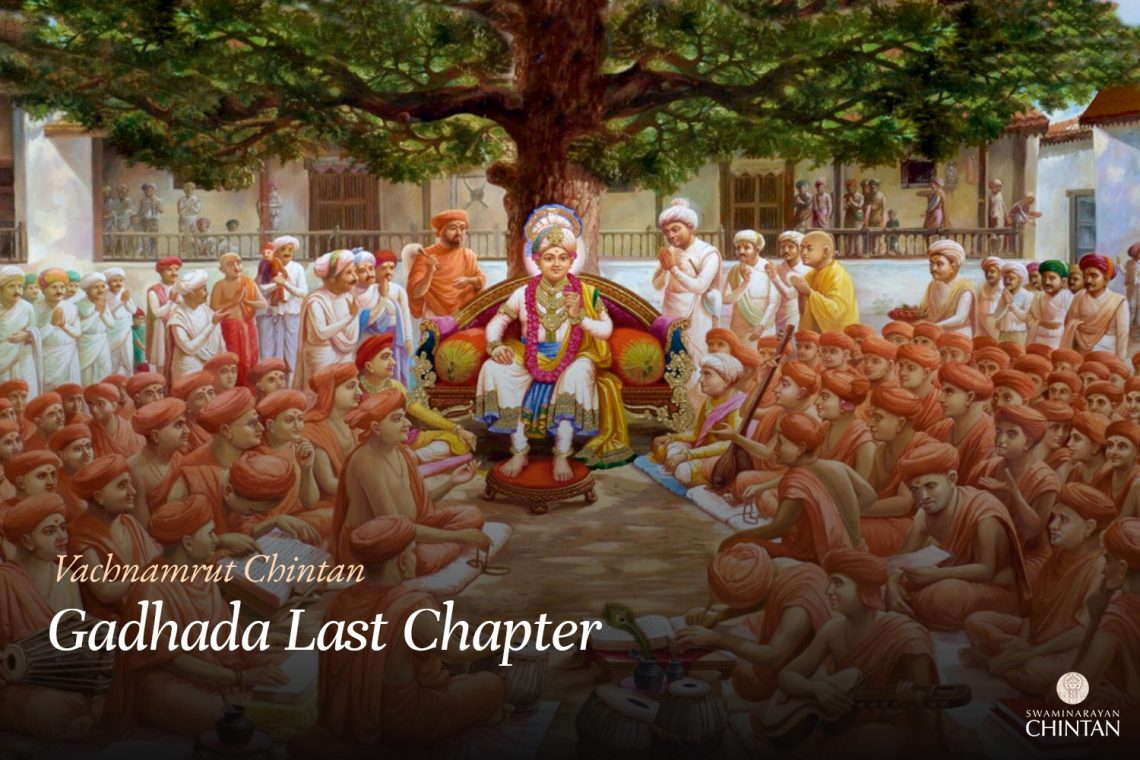Central Insights:
- Remembering the superior experiences of the past (bliss of Bhagwan).
Key Points:
- The bliss of Bhagwan or devotion, once truly experienced, is never forgotten.
- Even in unfavorable circumstances, this experience does not fade away.
Explanation:
In this Vachanamrut, Shreeji Maharaj explains that once a person truly realizes the divine nature of Bhagwan in their heart, this understanding never diminishes, even if adverse circumstances such as time or place arise. For instance, Bharatji retained the memory of Paramatma’s divine form and his devotion even in his mruga deha (deer body) and later in his brahman deha (Brahmin body).
Maharaj provides an analogy: a wealthy king or a rich merchant who loses their fortune and is reduced to poverty will still remember the sumptuous meals and luxuries they once enjoyed. However, a person born into poverty, unfamiliar with such luxuries, has no such memories. Similarly, a person who has once deeply experienced the bliss of Bhagwan’s divine form and worship will remember it, even if they lose contact with Bhagwan or Santo due to adverse circumstances. They might experience both happiness and suffering according to destiny, but the memory of that divine bliss remains etched in their heart. Conversely, a person who has never had such an experience is like a beast and has nothing to remember.
Therefore, while favorable conditions persist, one should deeply experience the bliss of Paramatma’s divine form, devotion, and the company of true Santo. If this profound experience is not attained during favorable circumstances, Maharaj states, that person is no better than an animal and has nothing to remember during adversities.
What is the nature of this bliss of Bhagwan? Maharaj elaborates that the divine form of Paramatma is unlike any human or celestial being. It is extraordinarily unique, and so are His bliss, power, and virtues. Through meditation and devotion, one should strive to experience this uniqueness in their heart. Furthermore, Bhagwan is unparalleled; His blissful nature surpasses that of even the Akshar Muktas. One must realize the divine uniqueness of His form.
Additionally, Bhagwan’s form is nirgun (beyond the three attributes of Maya), which means it uproots all bonds of Maya as one experiences it. Even while residing in His divine abode, Akshardham, He pervades the infinite universes as the antaryami (inner controller) of countless souls. Despite this, He is fundamentally distinct from those souls.
Just as fire, though residing in wood, is fundamentally distinct from it, Paramatma, while pervading the souls, is entirely unique and divine. Even when He assumes a human form, He remains divinely transcendent. When this knowledge of Bhagwan’s form is experienced in the heart, coupled with fervent devotion, it leaves an indelible mark. This divine uniqueness is perceived even amidst worldly activities, and the memory of such an experience never fades.
For example, a king recalls his previous luxuries, Bharatji retained his memory of devotion in his mruga deha, and Vrutrāsur remembered his divine knowledge even in an asuri yoni (demonic form). Similarly, Prahlad cherished the bliss of Naradji’s company from when he was in the womb. Once this realization is attained, it is never forgotten.
Why is this important? Maharaj emphasizes that if one ever becomes separated from Satsang, the understanding of this discourse will prevent feelings of despair, doubt, or fear of misfortune. Such an understanding firmly roots the soul, ensuring spiritual stability. Hence, it is vital to grasp and internalize this teaching fully.
Glossary
| Bhagwan’s Bliss – Divine happiness |
| Paramatma – Supreme God God, the all-pervading and ultimate reality. |
| Mruga Deha – Deer body |
| Brahman Deha – Brahmin body |
| Akshar Muktas – Liberated souls residing in Akshardham |
| Antaryami – Inner controller The omnipresent form of Bhagwan that resides within all living beings. |
| Nirgun – Beyond the three qualities of Maya |
| Satsang – Holy fellowship |
| Divine Uniqueness – Bhagwan’s unparalleled qualities |
| Indelible Mark – Permanent spiritual impression |
| Maya – Illusion The material energy that entangles the Jeev in worldly existence and distracts from Bhagwan. |
| Akshardham – The eternal supreme abode of Bhagwan Swaminarayan The divine realm where Bhagwan Swaminarayan resides along with Akshar Muktas (Divine Liberated Souls) |
| Vrutrasur – Devotee in demonic form |
| Prahlad – A devotee of Lord Vishnu Renounced his father, a demon king, due to his unwavering faith in Bhagwan. |

